By MELINDA J. OVERSTREET
for Glasgow News 1
Next Step Inc. is one of a few places in Barren County that offers crisis financial assistance for items such as utilities and rent, but its organizers’ aim is to tend to spiritual needs simultaneously with physical needs.
The signage on the door of the building at 107 W. College St. in Glasgow that for many years was occupied by the county’s public library, states that Next Step is “a Christ-centered place for help, hope & healing.”
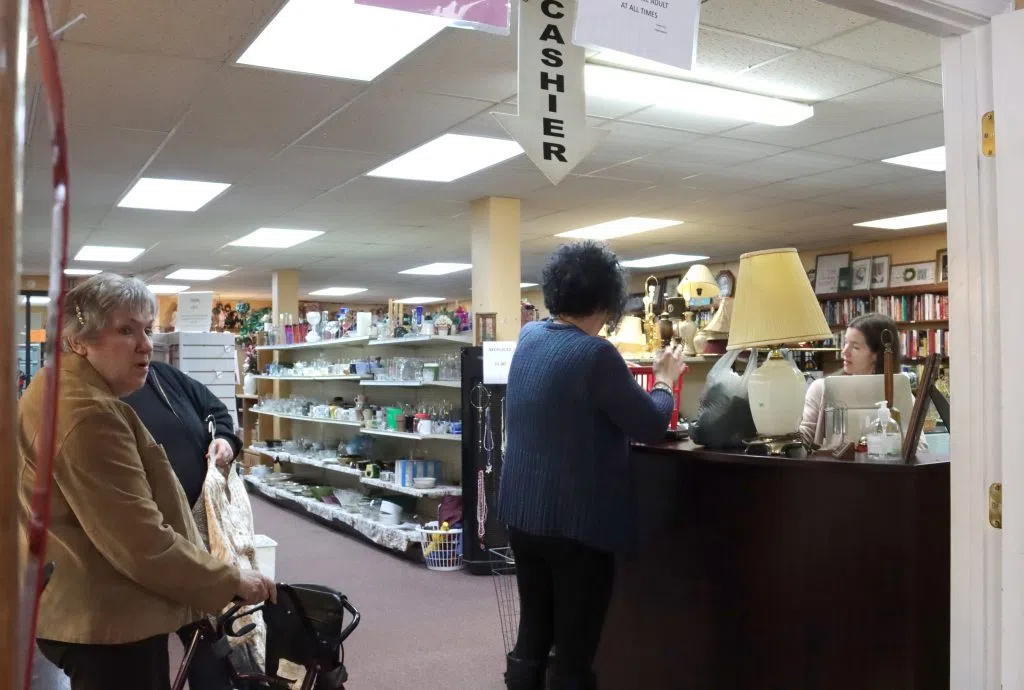
Linda Sewell, from left, and Lisa Hale wait their turn with the cashier as Teriann Christensen pays Jessica Uptegraff for the lamp and other wares she selected in the Next Step store, proceeds from which go toward programs that help with utilities and housing costs, among other services the organization provides. Melinda J. Overstreet / for Glasgow News 1
The main floor has a reception area and two rooms off to one side where crisis counselors meet with applicants, but the main room contains furniture for sale and the room beyond it has a wide variety of household goods for sale. Beyond that, shopping carts and shelves full of items await processing and pricing by volunteers.
Upstairs is the clothing store and food pantry; the clothing processing area; the office space of John Harbert, executive director; and a group of tables configured for the classes Next Step offers.
Background and core services
Harbert has been with the organization since its launch in March 2015.
“It had been in preparation for probably three or more years prior to that,” he said, “where the four churches that started it – Calvary Baptist, Coral Hill Baptist, Glasgow Baptist and Immanuel Baptist, the four primary Baptist churches in our area, had the idea because they felt they weren’t getting the groundwork they wanted to really affect the lives of the people that were needing help all the time, a lot of frequent flyers, you know. So they were like, ‘We’re helping these people, but we’re having to turn them away at a certain point. We just don’t feel like they’re responding well. Why don’t we create one benevolent agency that can handle all our county, and we can send everything there, and that would be their focus.’”
They started putting money into an account because they wanted to – and later did – create a nonprofit, 501(c)(3) ministry that would have that responsibility of tending to needs such as food, clothing, etc. to which those churches could refer people in need.
The startup money they had accrued allowed the organization to hit the floor running, he said.
“So the store initially came in for that reason: ‘Well, if we want to provide clothing and household items, we need to have a store,’” Harbert said, “so we started on a very limited basis that was very driven by the volunteers, initially.”
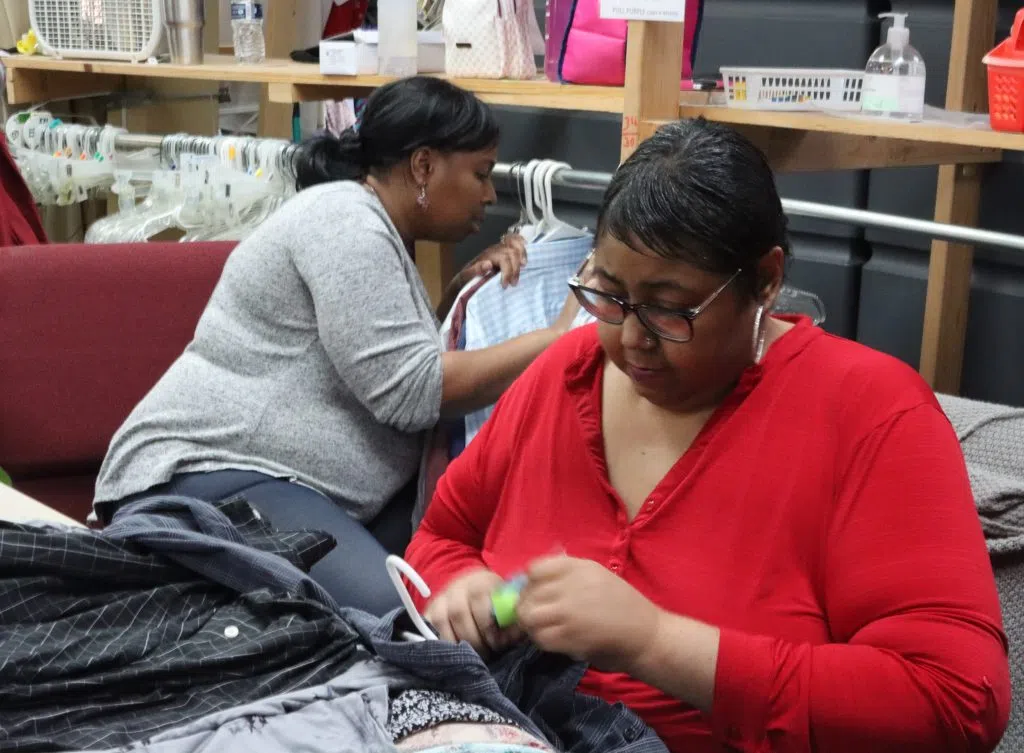
Volunteers Erica Allen, from left, and Stephanie Kirk, price clothing donations that will be for sale at Next Step. Melinda J. Overstreet / for Glasgow News 1
Having been a pastor for the previous 20 years, with 12 years of that pastoring a small church in Glasgow, they thought he would be a good fit because it’s very ministry-minded and he was looking for some additional work at the time, he said.
“It’s worked out really well for me. I’ve learned a lot,” he said. “A lot of the evolution here has been very much involved with the volunteer help. Obviously the volunteers are what drive this ministry, because we have typically 12 volunteers a day here in-building, handling all the facets of running the store,” Harbert said. “We have two paid employees now. We hired a store manager because it was just too much for me to continue doing all the ministry side of things as well as running the store.”
Becky Baise, a member of Coral Hill Baptist Church, came on board as the store manager two years ago, he said. Since he has no longer been pastoring, Harbert has been an elder at Coral Hill and was acquainted with her through that connection.
“What a fantastic job she’s done,” he said. “She’s really turned the store around.”
Revenue from the store sales now provides for more than half of Next Step’s budget, he said, as donations of everything from clothing to smaller household items to furniture and appliances continue to pour in from a community that’s been faithful.
Teriann Christensen, as she was leaving with the lamp and other items she had just purchased, said she frequents Next Step “quite often.”
“Not only have I used it to pretty much decorate my entire home, so individually and on a budget, I’ve also had to come to them to help use the resources to where they put all the money they make off of selling this stuff back into the community to help the less fortunate or people in need to pay bills or be able to afford their rent,” she said. “They’ve always been there when I needed them.”
Volunteers pick up donations for the store, typically one day per week, in a 14-foot box truck the organization has acquired.
“We just never know what’s going to come in,” Harbert said.
If the clothing items don’t sell after a couple of months, though, the items are provided to a baling company that then distributes them to other agencies that may be able to make use of them.
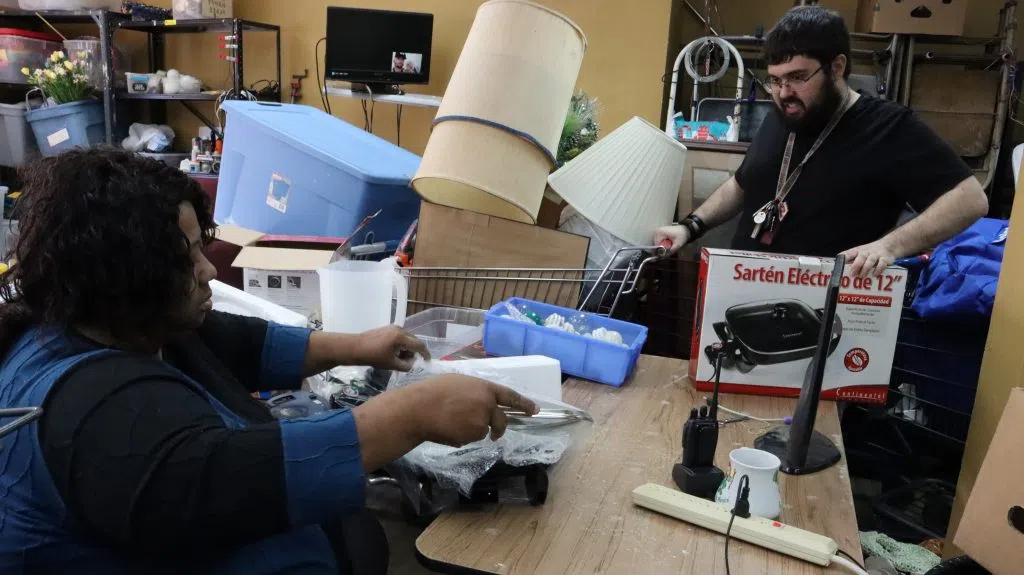
Volunteers Teresa Rumph, left, and B.C. McCandless, remove a donated electric skillet from its packaging to plug it in and make sure it works before it gets priced and put out for sale in the Next Step home goods store. Melinda J. Overstreet / for Glasgow News 1
The organization started, though, with the walk-in crisis/benevolent help with utilities and housing (rent or mortgage payments) and referrals to other local resources for the things or amounts Next Step can’t provide.
“We make sure to help them find the help they need and direct them as best we can,” Harbert said. “But obviously, the main thing we’re doing here and the whole reason behind what the churches wanted to do was for us to be giving out the gospel with every occurrence, so we are sharing the gospel with each person that comes in that we can. In some situations, they don’t want to hear it, or, you know, we’re not going to force ourselves on them, but we try to pray with them and make sure we’re attending to the spiritual needs and not just the physical. Because, to us, the most important thing is the spiritual needs.”
Getting help – expectations
“On the initial visit, we don’t focus heavily on getting all their information about their income and their expenses. We get a general answer from them; we’re OK with that …,” Harbert said. “The reason we don’t focus heavily on the first visit is because our primary mission is the gospel, so we don’t want to get into logistics so much that it’s discouraging them – from feeling scrutinized or whatever. We want to make sure that they’re going to be able to, hopefully, be open to talk to us and share with us their prayer requests, therefore giving us an opportunity to talk about our story and that leads to the gospel, so that’s kind of the flow of how we handle each session.”
They do get demographic and other information about the household members on an application, a copy of the applicant’s identification, like a driver’s license, and a document showing the expense that’s past due must be presented.
“All we require on the initial visit is the ID and the crisis – a bill or rental agreement,” he said, but documentation of income is not required.
With each “occurrence” of assistance from Next Step, though, the level of information and documentation sought increases.
“We’re hoping to build the relationship with each visit, so we are – we have, on the initial visit, on the back of it, we get all their information about if they go to church, if they don’t, an explanation,” he said. “If they go to church, ‘would you say you’re saved,’ so we’re trying to get the spiritual information for the next counselor and for the follow-up, because we also ask them, ‘Would you like a follow-up call, outside of our organization?’ So we give it to the churches, they have different volunteers. I send them a sheet that’s got the demographic information and spiritual information so they can look at it quickly, call them, talk to them again, you know, try to spend some time praying with them on the phone, so just continuing the – helping them see that we care, I mean, is what it really comes down to, because most people in this situation just want to know that you genuinely care for them and that you are actually showing the love of Christ to them. That’s what gives the best response to most encounters.”
The goal is to have one male and one female counselor on hand and place clients with a counselor of the same gender. Some of the counselors are or have been church pastors.
“We’ve got just a great pool of counselors that we know we can trust that are going to do what we’re wanting to have done here and all have a heart for this community, and that’s really a big part of it,” Harbert said.
The maximum amount a person could receive per visit had been kept below for a long time, he said, “until recently where the lord’s allowed us to have a stronger budget, and we’ve increased that to, you know, $150, $200, depending on the situation.”
Applicants don’t necessarily have to be at immediate risk for their service to be cut off to get help with a bill, for example, but it should be past the due date.
“We want to see that the crisis is real and that you are at a point where you definitely have no resources to take care of this bill and it’s due right now,” Harbert said.
Next Step does not make appointments; walk-ins are encouraged over calls because it can be difficult to get through on the phone line.
Applicants must wait three months between financial assistance occurrences and can only receive it twice a year. So, for example, if they got help in January and then again in April, they would have to wait until the following January to be eligible again.
Food assistance is available four times per year but the three-month wait in between still applies.
Once the food-growing season kicks in, two of the volunteers visit an Amish store early on Monday mornings and the community there contributes the produce that hasn’t been sold at that point. Harbert said that fresh produce is then placed in shopping carts that are rolled outside where anyone who needs it can take some.
If the receptionist sees in a person’s file when it’s pulled that a person is not eligible for help because it’s too soon since they last got help, he said, the protocol is to flag that but still let them see a counselor, so the counselor still has an opportunity to talk to them, “so we can still have captive audience with them while they come in.” It is then the counselor’s responsibility, after he or she has spoken with the applicant for a bit, to let that person know they aren’t eligible because it’s too soon but that they wanted to check in and see how they’re doing.
“We don’t want to discount any opportunity while they’re there, if they’ve made the effort to come in,” Harbert said.
If someone comes in seeking free furniture or other goods from the store, a closer look at their situation is undertaken, and if they are actually able to pay something, they are asked to do so unless it’s an extreme situation like a fire displacement.
“We don’t want to encourage entitlement,” he said. “Our slogan is a hand up, not a hand out, and that basically says it all.”
Teaching Biblical finances
If a client has received financial assistance from Next Step four times, that person is required to complete the free Faith and Finances course intended to teach clients how to better manage their finances before they can receive such help again. Assistance applicants don’t have to wait until they’ve gotten help four times to enroll, though, if they’re interested.
“We’re teaching them a Biblical understanding of finances, on a very limited basis,” Harbert said.
He and two others have become certified instructors for the curriculum developed by the Clarmers Center, Harbert said.
“It is a challenge getting them in there and getting them to finish …,” he said, “but the wonderful thing that we’ve seen happen is very few that have gone through the class ever come back, so there is a success rate there.”
The classes take place weekly for 10 weeks and are offered in the spring and fall. A workbook is provided to each student, and each student is assigned a mentor, called an ally, that attends class with them and continues to meet with them monthly for a year after the class is over to help ensure the client is staying on track, he said. Attendance at eight of the 10 class sessions is required for graduation, and 49 have graduated so far.
Some great relationships have been formed through the mentorships, Harbert said.
Serve to Earn and church volunteers
In addition to their financial support, the churches are responsible for sending volunteers, Harbert said, but some volunteers are members of the community at large who came in for help or some other reason, saw what Next Step was doing, had time on their hands and wanted to come back and help.
In addition, “We’ve developed a Serve and Earn program which is just basically vouchering help back to their bills on a very limited basis, to the point where it’s not considered an employee relationship,” Harbert said. “So we give them a $5 reward for a day served, for four hours, and that accumulates over the month, and they say, ‘I want it to go to my electric bill or my rent.’ And they’re living, most all of them, on a fixed income, so they’re living on a poverty-level income, so they can use that extra whatever.”
They tend to want to be there five days a week so they can get more funds to go toward those bills, but the most they can have at any given time is 10.
“The idea is to give them worth in that,” he said.
Trina Humphrey, who has also worked with the organization since its inception, has been helpful to him in multiple ways and volunteered on-site for the first several years. She has a different paying job now that has reduced those hours, but she still coordinates the volunteers, tracks the hours and ensures that the Serve and Earn gifted dollars are distributed where they’re supposed to go, he said.
Harbert expressed gratitude as named several other volunteers at different points in the interview.
“These people have been just such a huge help to me the nine years I’ve been here,” he said.
Besides Humphrey, three married couples have been with Next Step as long as or longer than Harbert. Bobby and Sue Elmore, Gerald and Karen Wood and Jimmy and Sharyon Shartzer, each contribute their individual talents, from managing food resources to counseling to building shelving to teaching.
Newer volunteers include Jerry and Beverly Thomas from Coral Hill Baptist, the latter of whom offered greetings from behind the reception desk.
“It’s what we do now,” she said, noting she and her husband are both retired. “When you’re here physically to see the need, it’s overwhelming sometimes. The need is great.”
She added later that the store has a lot of repeat shoppers, because they “get hooked.”
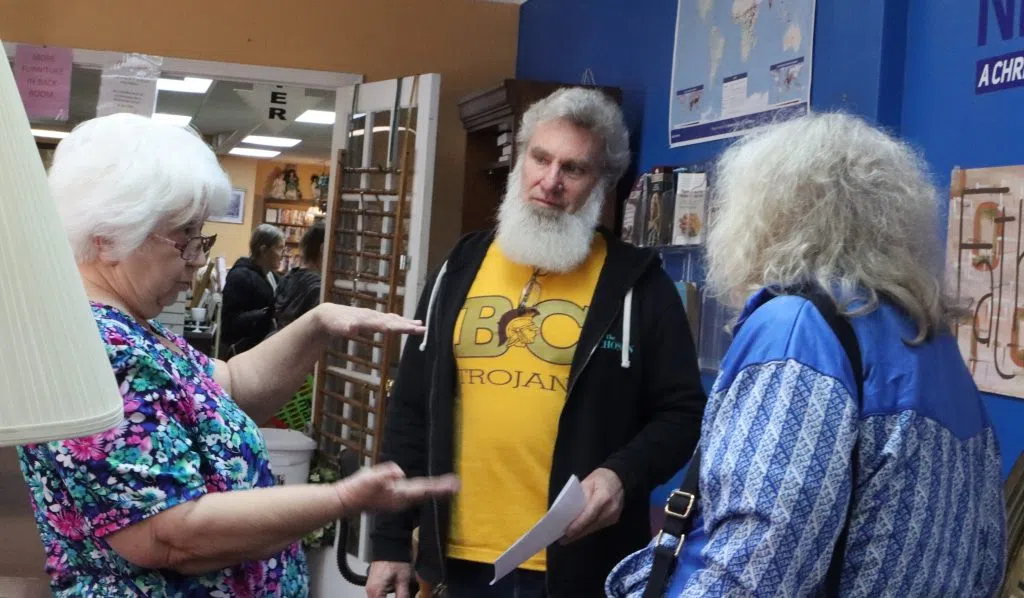
John Harbert, executive director of Next Step, center, listens as Becky Poynter, left, and Mary Dillard chat with him about a possible furniture donation to be sold at Next Step. Melinda J. Overstreet / for Glasgow News 1
Funding sources and assistance stats
In addition to the support from churches and revenue from the store, Harbert said some local factories and privately owned businesses also provide occasional financial contributions.
He said Atmos Energy, the natural gas supplier in this area, has supported Next Step with a grant for the past five years.
“They’ve been sending a generous grant to our ministry, so we can give more to an Atmos bill than we can to another one, because we have that money that we need to try to use up,” he said. “Last year, we had no problem spending the $5,000 that we received from them, and they’ve upped it this year to $7,500, so it’s very generous for a smaller ministry like us.”
With the resources provided to Next Step, Harbert said that in 2022, for example, there were 937 assistance occurrences, but that figure dropped to the mid-800s in 2023.
A total of $34,272.53 in crisis funding was provided in 2022, along with $15,936 worth of food in 664 food boxes.
The store’s gross income was similar for 2022 and 2023 at more than $108,000, but in 2018, it was roughly $60,000.
Oversight
The board of directors for Next Step is “a working board” that is very involved and meets monthly, Harbert said. Three seats are always pastors, one of whom is typically the chair, and the other six are members of the partner churches who are recommended by their respective churches. The board members serve three-year terms.
“The board members have to be people that are vested in the ministry …,” he said. “So, we’re asking for people, much like the counselors downstairs [who work with the crisis applicants], that we know are born-again believers that have a strong faith and the same motivation we have in the ministry we’re doing. Otherwise, if the leadership’s not that way, then the decisions being made aren’t going to be in line with what we’re trying to accomplish.”
Moving along
The number of churches that now financially support Next Step’s work has quadrupled from that original four, and they include some of denominations besides Baptist.
To be considered a partner church, “all we require is for them to make a line item in their budget for us. We don’t say it has to be a certain amount; we just say, ‘Whatever you guys can work out in your missions budget … you can pay us once a year or monthly, as long as we have that regular support coming in.’”
The local Mormon church started sending volunteers, he said, after it was determined the end goals were mutual enough that no conflict could be anticipated.
The former library facility was purchased by its neighbor, Glasgow Baptist Church, which started using it as a ministry center, so it naturally was an obvious place for Next Step when it was time for it to launch. The pastor at the time was willing to all but give the newly formed organization for which his church was a founding partner the space for three years. After that, the church began charging “a really small amount of rent,” Harbert said. “It’s very generous.”
Harbert said Next Step’s programs – particularly the store – have grown so much, it’s “definitely outgrown” the current space of roughly 9,000 square feet spread throughout two floors, so the search is on for a one-level location with even more space for Next Step’s current and future endeavors plus possibly room for other types of ministries. He said he would love to see a shelter facility be part of that.
NOTE: This report is part of a new series focusing on local nonprofit organizations.
————————————
NONPROFIT IN A NUTSHELL
NAME: Next Step Inc.
ADDRESS: 107 W. College St., Glasgow
PHONE: 270-659-0020
ONLINE: www.nextstepglasgow.com and on Facebook as Next Step Ministries.
PUBLIC HOURS*: crisis assistance 10 a.m. to 2 p.m. [with last client session starting by roughly 1:30] Mondays, Tuesdays and Thursdays; 10 a.m. to 2 p.m. Monday through Friday store hours
SERVICES OFFERED: rent/mortgage assistance; electric, water and natural gas utility assistance; food pantry; possibly other goods from store; Faith and Finance financial management classes
RECIPIENT ELIGIBILITY: Barren County resident, past-due bills, income and expense information
DONATION REQUIREMENTS: unexpired, nonperishable food; clean, ready-to-wear or -use clothing and household items
FUNDING SOURCES: local churches, revenue from store sales, Atmos Energy grant, some businesses/individuals
OVERSIGHT: local 9-member board with at least three pastors of member churches and church members for the rest
STAFFING: 2 part-time employees, roughly a dozen volunteers that are “regulars,” and about 10 Serve to Earn volunteers
*nonholidays
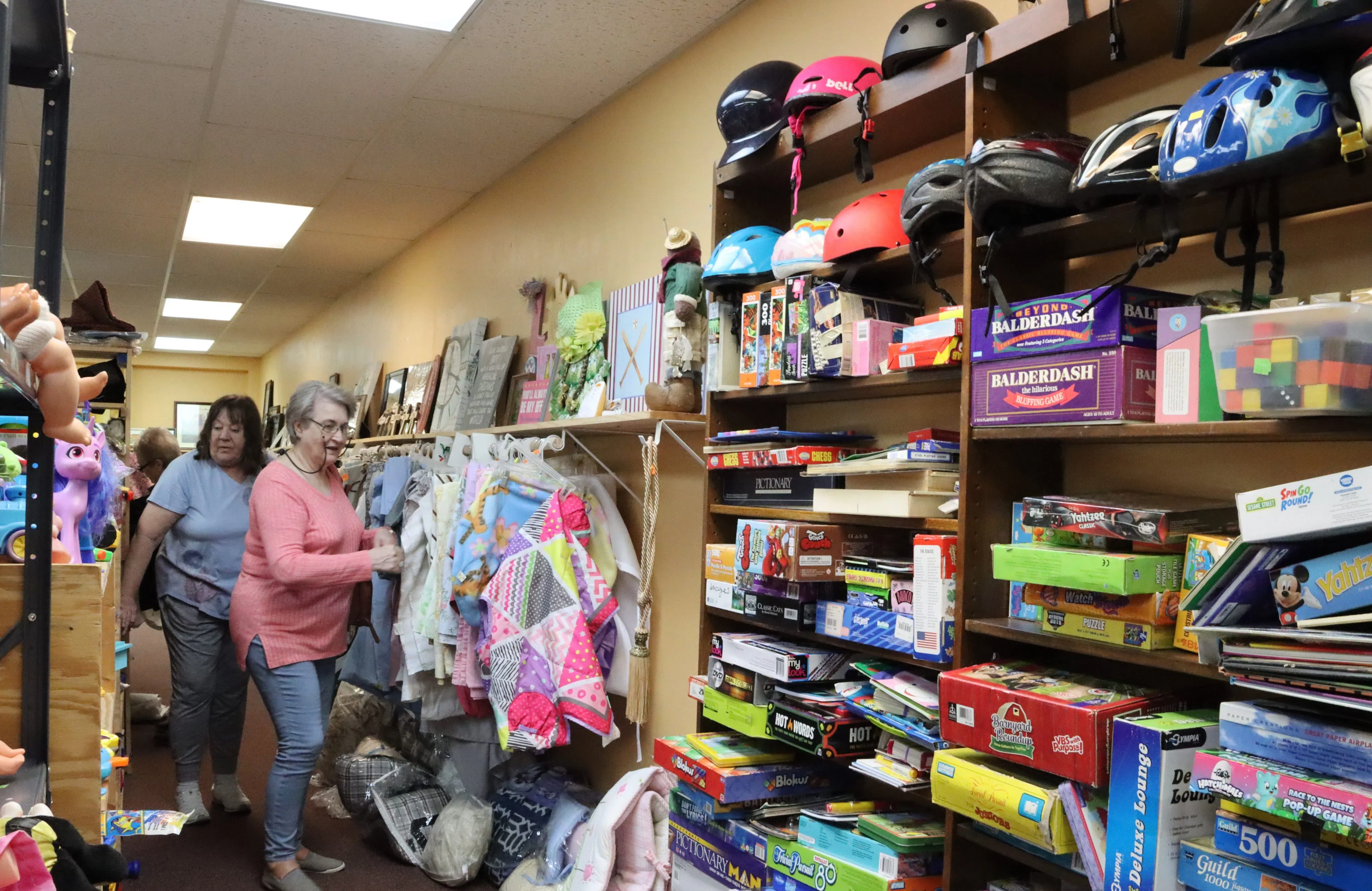
Thankful for News 1 Glasgow and Melinda Overstreet for the thorough and informative article. I know God will use it to make our ministry better known in our community. ‘A place for Help, Hope, and Spiritual Healing’